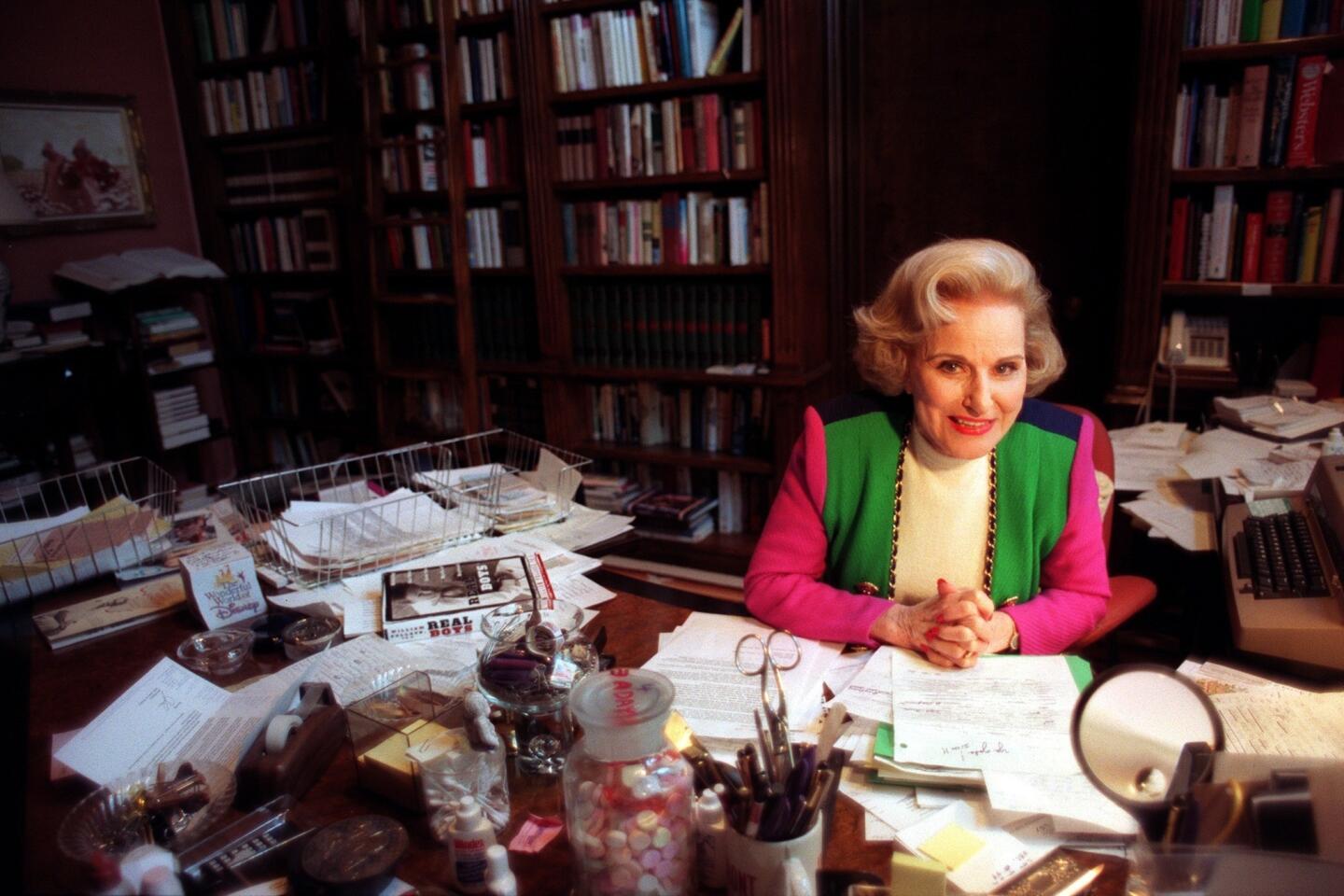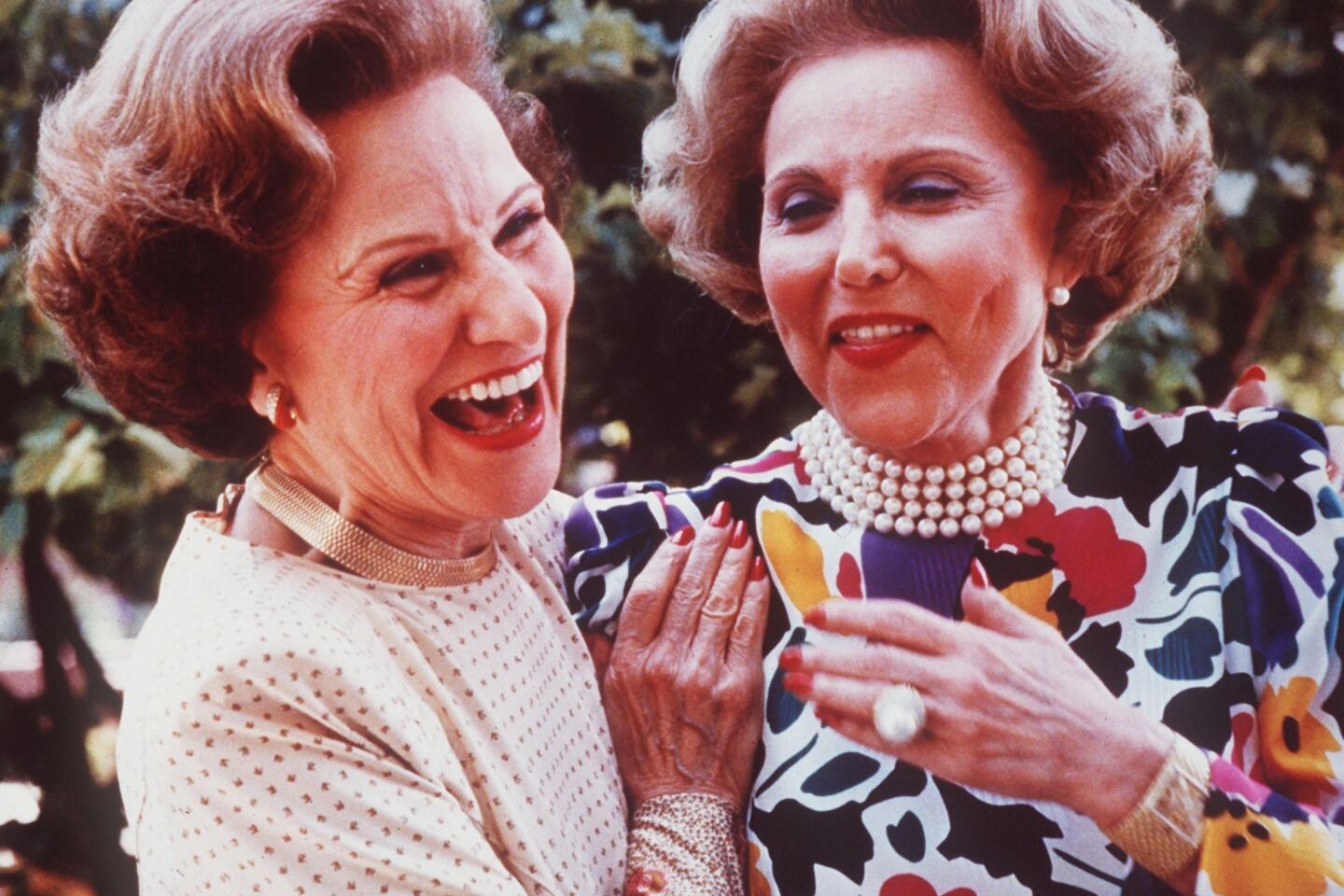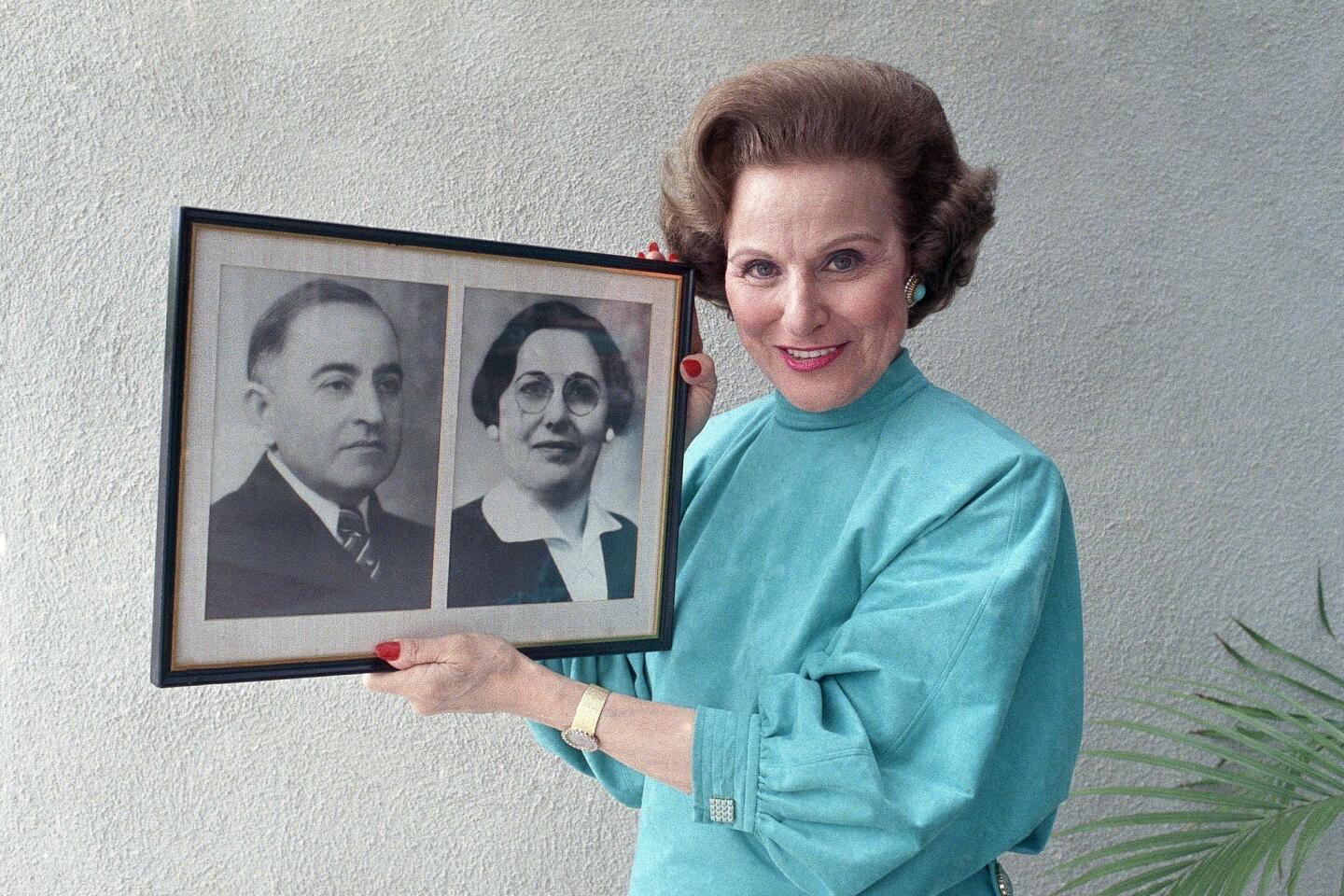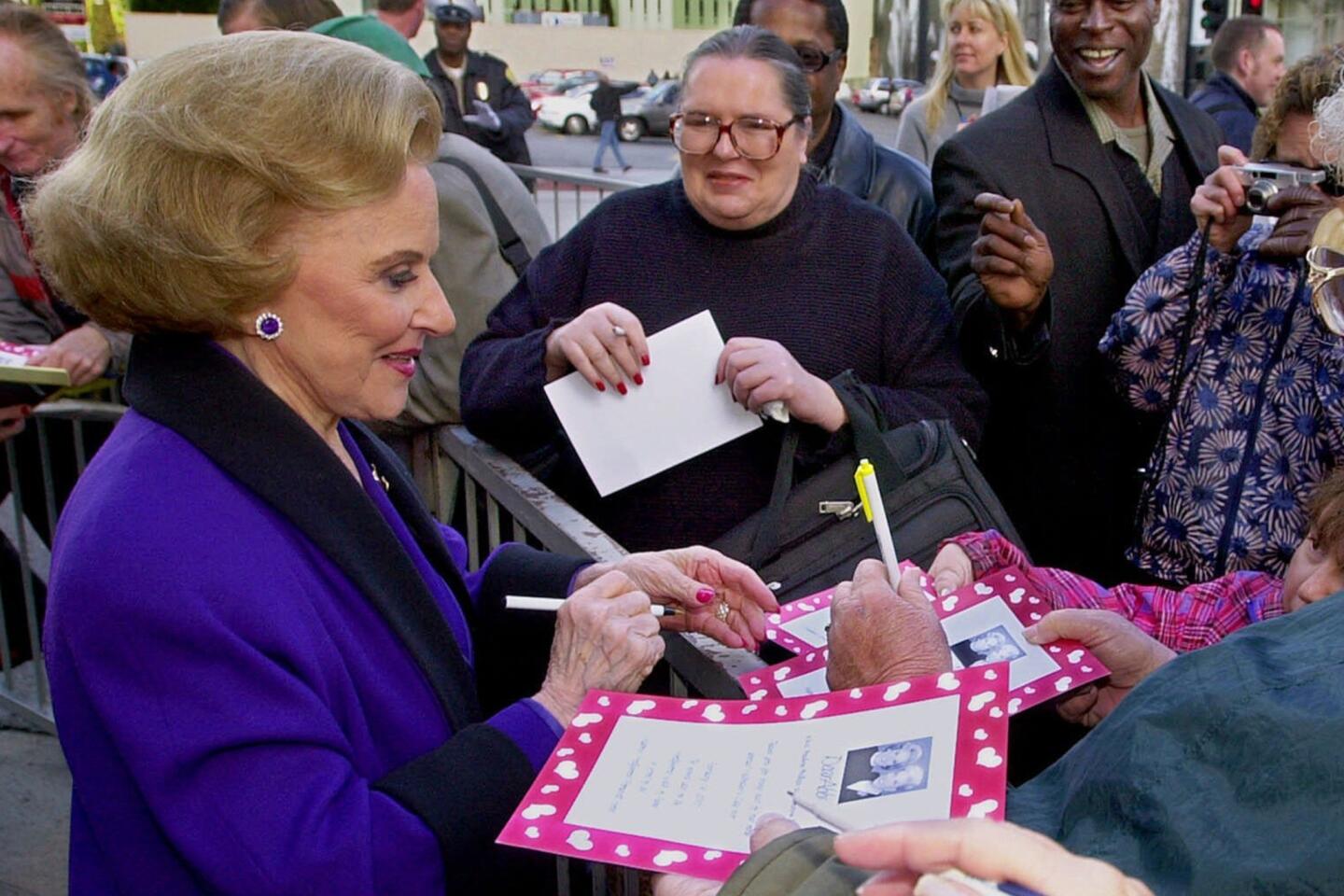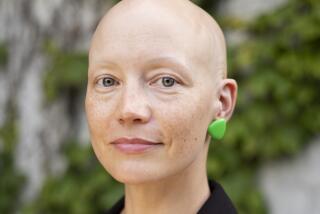Pauline Friedman Phillips dies at 94; original ‘Dear Abby’
Dear Abby: “What would you do with a man who refuses to use a deodorant, seldom bathes, and doesn’t even own a toothbrush?”
“Absolutely nothing,” she replied.
The wry answer from Abigail Van Buren — the pen name of Pauline Friedman Phillips — was typical of the advice she dispensed for more than 40 years to newspaper readers around the world through her “Dear Abby” column, which debuted in 1956 in the San Francisco Chronicle.
She got the bug to write it from her identical twin, who was already providing more homespun counsel in a syndicated newspaper column as Ann Landers. Over the decades, Phillips’ witty exchanges with readers about snoring or prom dates would give way to more serious subjects as society underwent an upheaval.
Dear Abby spanned the sexual revolution (one reader cheekily asked where it was taking place and how he could get there), the women’s movement (she actively campaigned for the Equal Rights Amendment), the legalization of abortion (she favored abortion rights), and the advent of AIDS (she advocated frequent testing and education).
Phillips, 94, died Wednesday in Minneapolis, according to a statement from Universal Uclick press syndicate. Her family announced she had Alzheimer’s disease in 2002, the year her twin sister died.
By 1957, Time magazine had declared “Dear Abby” the “fastest-rising star in the field of journalism.” The sisters’ rival columns caused a years-long estrangement between them — and turned them into two of the most famous and influential women of their generation.
“Dear Abby” is the world’s most widely syndicated column, appearing in more than 1,400 newspapers and generating as many as 10,000 letters a week, according to the syndicate.
Dear Abby: “Are birth control pills deductible?”
“Only if they don’t work,” she answered.
From 1939 until her death, she was married to Morton B. Phillips, scion of the National Pressure Cooker Co. From an office in their Beverly Hills home, she edited the column into her 80s. She started sharing a byline with her daughter, Jeanne Phillips, in 2000 and turned the column over to her two years later.
“My mother leaves very big high heels to fill, with a legacy of compassion, commitment and positive social change,” Jeanne said in a statement. “I will honor her memory every day by continuing this legacy.”
Phillips’ influence could be astonishing. When she urged readers to mark President Reagan’s birthday in 1985 by sending $1 to the White House for the March of Dimes, the president wrote her to ask that donations be sent directly to the charity. Within a month, $41,000 had poured in.
The single greatest number of responses — 300,000 — came in reply to a 1992 column that asked: “Where were you when President John F. Kennedy was shot?” She turned these into one of the six books she wrote. She also took great pride in the huge response to “Operation Dear Abby,” launched in 1985 to encourage readers to correspond with military personnel overseas.
The youngest of four daughters of Jewish immigrants from Russia, the twins were born in Sioux City, Iowa, on July 4, 1918, and given the confusing names of Pauline Esther Friedman (the future Abby) and Esther Pauline (Ann). They were nicknamed Popo and Eppie.
The improbable saga of “Dear Abby” began in 1955 when Phillips was an affluent homemaker in Hillsborough, Calif., with time on her hands, doing volunteer work and playing mah-jongg. Her twin, who’d just been hired by the Chicago Sun-Times Syndicate to take over the Ann Landers column, began soliciting her help with replies.
Extremely close, the sisters were thrilled to be collaborating, but the arrangement abruptly ended when the syndicate that distributed the Ann Landers column learned of it.
“Having acquired a taste for dispensing advice,” as Phillips wrote in her 1981 book, “The Best of Dear Abby,” she offered to write a column for the San Mateo Times, but it declined.
When she called the San Francisco Chronicle, she identified herself to feature editor Stanleigh Arnold as a Hillsborough housewife and said she could write a better column than the one the paper published. Intrigued by her brashness, he invited her to stop by sometime.
The next morning, she showed up. He was “visibly underwhelmed” upon hearing her qualifications but handed her a stack of published columns and told her to come back in a week with her answers.
Two hours later, she returned with replies that were “mostly flip, saucy one-liners,” she later recalled, and was hired the same day.
On Jan. 9, 1956, she wrote, “with my participles dangling and my infinitives splitting, I was launched in my writing career” — and terrified that nobody would write in.
Her husband advised her to “copyright your pen name and own it yourself.” She decided on Abigail Van Buren, combining the names of a biblical character and a favorite president.
From the start, letters poured in and the column was soon sold to a syndicate. Her little “hobby,” as she always called it — insisting that her husband and family were her career — had landed her in the big time.
But success came with a price, a heartbreaking rift with her twin, who felt betrayed when her sister started her own column. Their seven-year rift ended when her sister broached a reconciliation. Esther’s daughter, Margo Howard, would also write an advice column, for the online magazine Slate.
“Dear Abby” had come a long way from Sioux City, where the Friedmans’ well-off father owned several movie theaters.
At Morningside, a local Methodist college, the vivacious and popular twins started a gossip column, “Campus Rats.”
They dropped out of college to marry in 1939, two days before they turned 21. They wore identical gowns in a double ceremony and went on a double honeymoon.
Their husbands were men of vastly different means. Pauline had met hers, Morton Phillips, at a University of Minnesota fraternity dance. He came from great wealth while Eppie’s husband, Jules Lederer, was a millinery salesman who later joined the Phillips business empire. (A 1975 Ann Landers column announcing her divorce caused a kerfuffle.)
Early in their marriages, the two couples lived in Eau Claire, Wis., where Phillips refined her listening skills while volunteering at a local hospital.
Dear Abby: “Our daughter-in-law was married in January. Five months later she had a 9-pound baby girl. She said the baby was premature. Tell me, can a baby this big be that early?”
“The baby was on time. The wedding was late. Forget it,” was her rejoinder.
The letters could be so outrageous, Phillips was forced to deny they were invented, saying nobody “could make up situations to equal those that turn up in my daily mail.”
Over time, she was as much counselor as entertainer. Readers were coping with drug abuse, incest, rape and domestic violence. As the divorce rate escalated, “Dear Abby” — whose traditional Midwestern values included a conviction that marriage was forever — amended her thinking. (Besides her sister, both of her children would divorce.)
Although she disapproved of sex before marriage, she wrote that girls who were sexually active should be given birth control pills. As early as 1975, she took a “love and let love” attitude toward homosexuality, once writing that she tended to agree with the titled English lady who said of sexual practices that “she didn’t care what people did, just as long as they didn’t frighten the horses.”
A nonsmoker, she crusaded against smoking and in 1994 caused a stir when she suggested that legalization of recreational drugs was “an idea to consider.”
Much of her column material was provided by philandering spouses, despite her own 1986 survey, which found that an overwhelming majority of readers claimed to have been true to their vows.
Dear Abby: “What is the cure for a man who has been married for 33 years and still can’t stay away from other women?”
“Rigor mortis,” she replied.
Some readers sought quick and easy solutions while others just wanted to confess or were lonely. “They trust me,” she once said, “and the price is right.” But she added, “Some are kooks, some fabricate problems, but I can usually spot the phonies.”
She regularly turned to Mayo Clinic doctors, as well as lawyers, social workers, psychiatrists and clergymen, for advice and also referred letter writers to community agencies that could help.
Only a fraction of reader letters ever saw print. Phillips answered many personally, sometimes by telephone if she felt a writer was in crisis. When a desperate-sounding woman said her doctor wouldn’t see her for two weeks, the columnist called the doctor and made an appointment that day.
As Mrs. Morton Phillips, she was a socialite who counted among her friends Cary Grant, June Allyson, Neil Simon and Marsha Mason, Rhonda Fleming and Henry Winkler. On the wall of her home hung photographs of the columnist with the famous — Pope Paul VI, Harry Truman, Prince Charles and Princess Diana.
A petite woman who favored shoes with spike heels, Phillips exhibited personal flair. She had long sported a bouffant flip hairstyle and had a vast, and rather flamboyant, wardrobe. She once owned two monkeys and kept a collection of monkey-related collectibles.
Phillips supported cancer research and gave generously of her time to such organizations as Goodwill Industries, the Crippled Children’s Society and the American Foundation for AIDS Research.
As a philanthropist, she supported Planned Parenthood, San Francisco-based Project Open Hand, Los Angeles-based Project Angel Food, the American Civil Liberties Union and the Rape Treatment Center at Santa Monica-UCLA Medical Center.
Dear Abby: “Do you think about dying much?”
“No,” she replied. “It’s the last thing I want to do.”
In addition to her husband and daughter, she is survived by four grandchildren and two great-granddaughters. Her son, Edward Jay Phillips, died in 2011.
Beyette is a former Times staff writer and Nelson is a Times staff writer.
Times staff writer Marisa Gerber contributed to this report.
More to Read
Start your day right
Sign up for Essential California for the L.A. Times biggest news, features and recommendations in your inbox six days a week.
You may occasionally receive promotional content from the Los Angeles Times.
